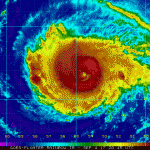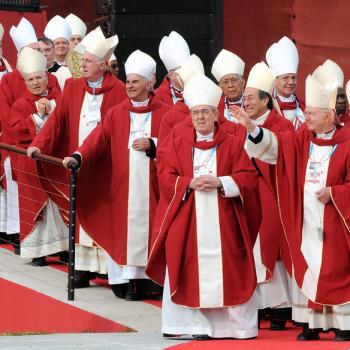Milbank, the British Anglican theologian who is the key “radical orthodox” theologian (a movement that uses a postmodernist critique of modernity in the service of conservative Christianity), suggests that the world’s religious landscape is more complex than is generally realized.
The liberal assumption that religion would die out has not come to pass. “If religious influence is returning in the West,” he says, “that is largely because no viable human society has ever been founded upon negation, the primacy of the lone individual, and an agreement merely to differ.” Cultures must have religion of one kind or another.
So it is natural, he believes, that cultural and even political movements are looking for religious support. Thus the new influence of religion.
But this influence of religion means that liberalism, where it still exists, will want to restrict it. The liberal ideologies are individual autonomy, sexual freedom, and secular materialism–which still exert considerable power in the West–wants to tamp down religious liberty, which used to be foundational to the liberal “rights of man.”
Thus there is a logic to the seemingly contradictory place of religion in the 21st century.
But Milbank notes one glaring exception to the liberal hostility to religion: Islam. For the liberal elite in the West, Islam is given a pass. That religion, alone among the others–including the Christianity of the West’s origins–is still to be respected, excused, and protected.
Part of this is due to the curious liberal reaction against Western culture, which can be seen especially clearly in academia. In this mindset, Milbank writes, “nothing positive in the European past is to be affirmed – not the uniqueness of Greece, the irreplaceability of Israel, the exemplarity of Rome, the truth of Christianity, the more beneficial aspects of empire – that this is most established by allowing only a foreign positivity, including an alien imperialism. ”
My further observation: The Left hates and fears Christianity as being oppressive, violent, harmful to women, and limiting freedom. These charges against Christianity are not true. But the Left honors Islam, which really is oppressive, violent, harmful to women, and limiting freedom. The Left makes an exception for the one religion that actually embodies what it fears about religion!
Milbank’s analysis is subtle and nuanced, and I have just scratched the surface here. It ties into his sense that liberalism–both of the left and of the right–have created so many internal contradictions that we are moving into a “post-liberal” era, one in which religion will reassume its rightful place.
Whether this will happen or not, or whether his analysis is correct are open questions. For example, is what he describes as “religious influence” actually religions exercising their moral authority, or are political movements co-opting religion for their own ends? As a British observer, Milbank surely exaggerates the actual influence of evangelical Christianity on American culture, even though evangelicals have found a place for themselves in the Republican party. But how influential are they really, even in that party?
At any rate, read Milbank’s essay. What do you think of his analysis?
Illustration by suju, Pixabay, CC0, Creative Commons


















